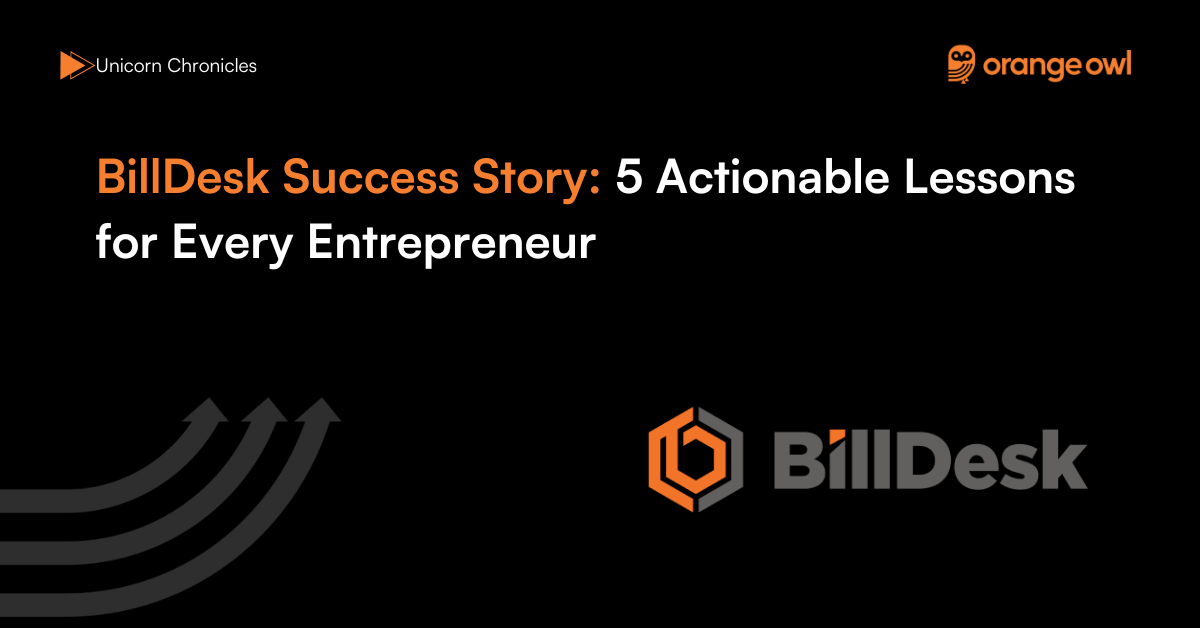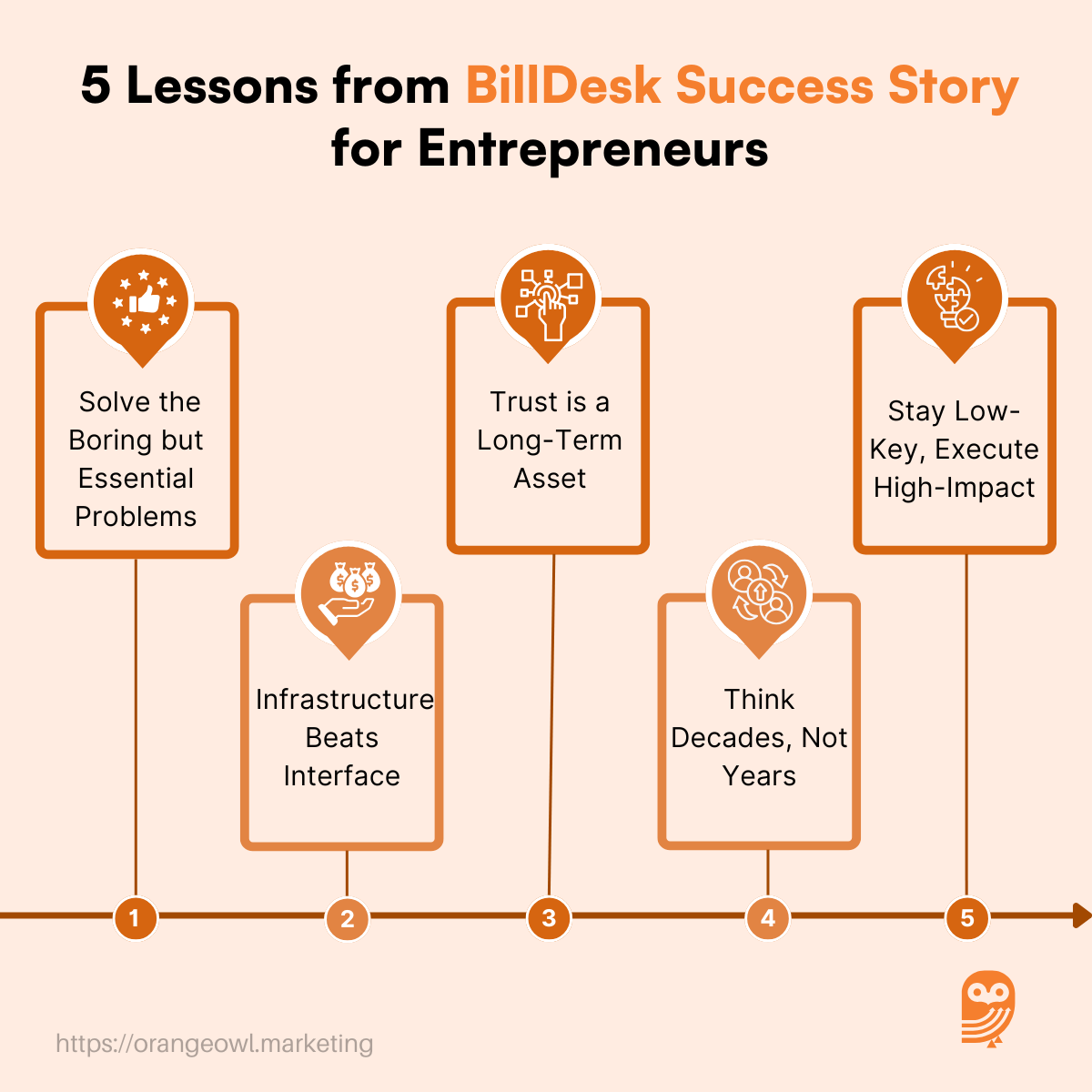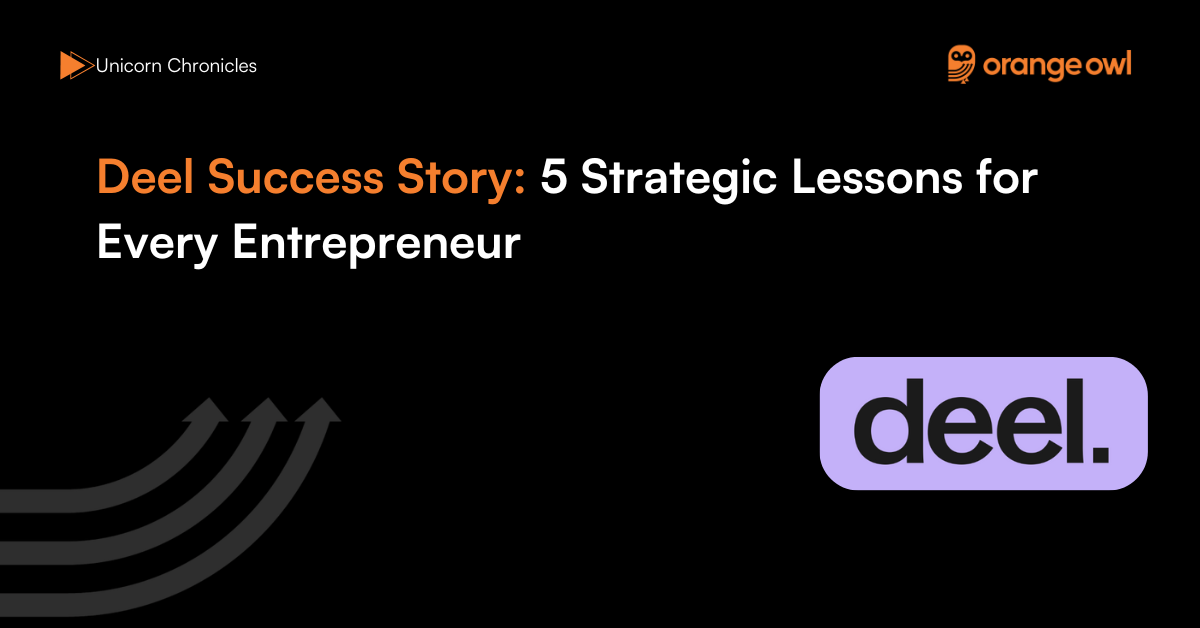BillDesk Success Story: 5 Actionable Lessons for Every Entrepreneur
Vivek Goel
May 13, 2025

Table of Contents
Introduction
In a world moving rapidly towards digital payments, BillDesk has long been one of the silent giants powering India’s fintech infrastructure. While consumer-facing apps often steal the limelight, BillDesk built the rails beneath the surface — enabling seamless transactions for banks, telecom companies, utilities, and e-commerce platforms. Founded in 2000, long before India’s startup boom, BillDesk played a foundational role in digitalizing the country’s bill payments and online collections.
As of 2023, BillDesk processed over $100 billion in annual payment volumes, according to publicly available industry estimates. It served more than 70% of India’s online billing transactions, handling payments for electricity boards, telecom operators, insurance providers, and government entities. Despite staying low-profile, the company reached unicorn status and was acquired by Prosus (formerly Naspers) for $4.7 billion in a landmark deal (though later terminated), signaling its immense value in the Indian fintech ecosystem.
BillDesk’s journey is a masterclass in building infrastructure-first businesses that quietly create value at scale. Its founders – MN Srinivasu, Ajay Kaushal, and Karthik Ganapathy – were former Arthur Andersen consultants who believed in solving the most basic but critical problem in Indian payments: bill collection. Over two decades later, their vision still powers a majority of India’s recurring payment flows.
Origin Story
BillDesk was founded in 2000 by MN Srinivasu, Ajay Kaushal, and Karthik Ganapathy — three professionals who left secure careers in consulting and banking to solve a problem that most Indians accepted as a monthly inconvenience: standing in long queues to pay utility bills. At the time, India’s internet economy was still in its infancy. E-commerce was barely known, digital payments were virtually nonexistent, and most transactions were strictly cash-based.
What made BillDesk stand out from the beginning was its laser-sharp focus on solving a real, pervasive problem. In an interview, co-founder MN Srinivasu reflected,
“We didn’t chase hype. We chased a very real problem. And that problem was — how do we help millions of Indians pay bills without friction?”
The founders realized early on that digital bill payments could save consumers time and bring massive operational efficiencies for banks, telecom operators, electricity boards, and government departments. However, with no UPI, NEFT, or mobile wallets at the time, BillDesk had to build everything from scratch — the billing platform, payment gateways, integrations, and trust.
Starting with a few pilot partnerships, the team spent years educating institutions on the benefits of digital payments. They forged relationships with banks and utility providers, persuading them to join a vision of an interconnected, tech-enabled billing ecosystem. It wasn’t a glamorous tech startup in the traditional sense — there were no viral apps or VC buzz — but BillDesk’s quiet, persistent execution made it one of the most consequential fintech companies in India.
Business Landscape and Challenges
When BillDesk launched, the odds were stacked against it. The early 2000s were a time when paying bills meant visiting bank branches, physically queuing up, or handing over cash at collection centers. Internet access was limited to dial-up connections in urban households. Digital literacy was low, and the idea of entering sensitive financial information online was met with deep skepticism.
The payments infrastructure was rudimentary. Real-time fund transfer systems like NEFT and RTGS were either unavailable or not adopted widely. Security protocols were still evolving, and banks were hesitant to trust third-party platforms with payment processing and settlements. On the customer side, online transactions were rare, and credit/debit card penetration was low.
To succeed, BillDesk had to solve a multifaceted puzzle. It wasn’t just about developing good technology — it was about building trust with stakeholders across sectors. As MN Srinivasu mentioned in an interview,
“The hardest part wasn’t building tech. It was aligning stakeholders — regulators, banks, merchants — and getting them to see a shared vision of digital payments.”
Despite limited capital and virtually no playbook to follow, BillDesk focused on enterprise-grade reliability. They built strong backend integrations, offered seamless settlement mechanisms, and ensured regulatory compliance from the start. Their API-driven approach allowed utility companies to plug into their billing engine easily — laying the foundation for what would become the infrastructure backbone of India’s digital billing system.
Over time, BillDesk earned the trust of hundreds of institutions and became synonymous with secure, scalable, and dependable bill payments. Long before the fintech boom, BillDesk was already doing the quiet, critical work of transforming how India pays.
Growth Strategies
BillDesk’s success wasn’t built on blitzscaling or VC-backed hype. It was built patiently, through partnerships, compliance, and reliable execution. Key strategies included:
- Enterprise-first focus: Instead of targeting consumers, BillDesk focused on large institutions — banks, government departments, and utility companies — becoming embedded in their core operations.
- Platform-as-a-service model: BillDesk didn’t just offer a payments gateway; it provided a comprehensive platform for invoicing, reconciliation, reminders, and settlements.
- Strong regulatory alignment: The company worked closely with RBI and NPCI to ensure its infrastructure was secure and compliant — laying the groundwork for newer innovations like BBPS and UPI.
- Reliability over speed: While many startups focused on rapid expansion, BillDesk prioritized uptime, security, and accuracy — which earned long-term institutional trust.
This approach helped BillDesk scale sustainably without spending heavily on consumer acquisition. Its backend was soon powering apps like Google Pay, PhonePe, and Paytm — making it indispensable.
Marketing Strategy
BillDesk’s marketing strategy was unconventional — it didn’t market at all in the traditional sense. Instead, it focused on institutional credibility and silent scale. Key approaches included:
- B2B branding: BillDesk never chased consumer mindshare. Instead, it became a trusted partner to banks and enterprises, securing exclusive integrations and long-term contracts.
- Trust through delivery: Word-of-mouth among institutions and regulators became BillDesk’s strongest marketing engine. High system reliability and data security made it the preferred choice for critical financial services.
- Thought leadership: The founders actively participated in industry discussions, working closely with government bodies to shape India’s digital payments roadmap.
- Co-branded visibility: Many consumer payment portals carried the “powered by BillDesk” tag, subtly reinforcing brand recognition without paid media.
By becoming the invisible force behind billions of transactions, BillDesk created one of the most influential positions in India’s financial ecosystem — without ever advertising on TV or social media.
5 Actionable Lessons for Every Entrepreneur
1. Solve the Boring but Essential Problems
BillDesk didn’t enter a glamorous space. It wasn’t building a ride-hailing app, a social media platform, or a consumer-facing fintech product. Instead, it focused on something deeply unsexy — bill payments. But in that mundanity lay a massive opportunity. Millions of Indians faced monthly friction in paying utility bills, and institutions lacked a seamless way to collect payments. BillDesk identified this pain point early and doubled down on solving it comprehensively.
“It’s okay to be boring, if what you’re building is valuable enough,” said co-founder MN Srinivasu.
Entrepreneurs often chase hype-driven sectors. But the BillDesk story shows that solving real, high-frequency, and painful problems — even if they aren’t flashy — can lead to immense, compounding value.
2. Infrastructure Beats Interface
While many startups obsess over user experience and interface design, BillDesk focused on building the rails. Their mission was clear: enable institutions and banks to collect payments efficiently, securely, and at scale. They weren’t trying to wow end users with design. They were creating the infrastructure that powered countless services behind the scenes.
This insight is crucial. Not every startup needs to be consumer-facing. Building foundational tools that power ecosystems — even if invisible to the end-user — can be equally valuable. For entrepreneurs, the question should be: are you building something necessary, or just something that looks good?

3. Trust is a Long-Term Asset
In fintech, trust isn’t a luxury — it’s the foundation. From day one, BillDesk prioritized regulatory compliance, data security, and operational consistency. They understood that payments are a trust-driven business, and even the smallest misstep could jeopardize long-term growth.
Rather than chase rapid scale or virality, they patiently earned credibility — first with banks, then with billers, and finally with regulators. Over time, this trust became their biggest moat. Startups, especially in regulated sectors, should recognize that hype fades, but trust compounds.
4. Think Decades, Not Years
BillDesk was never a “blitzscaling” success. It took more than a decade to reach profitability. It wasn’t until 2018 that it was valued at over $1 billion, and even then, it operated largely under the radar. But what it built was enduring — a payments infrastructure embedded into the daily operations of banks, telecoms, and utilities across India.
This long-term thinking is a valuable lesson. In an ecosystem obsessed with quick wins and fast exits, BillDesk played the long game. Entrepreneurs should understand that sustainable impact often takes time — and staying power is just as critical as speed.
5. Stay Low-Key, Execute High-Impact
BillDesk’s brand was never loud. It didn’t rely on PR stunts, aggressive marketing, or social media buzz. Instead, it focused on consistent execution, high-quality partnerships, and real results. It proves that not every great company needs to be a household name — many of the most impactful ones work quietly behind the scenes.
“We weren’t trying to be famous. We were trying to be useful,” said Srinivasu
In a world of noisy startups, BillDesk stands out as a model of quiet effectiveness. For entrepreneurs, the message is powerful: let your product speak louder than your promotion.
Conclusion: Key Takeaways from BillDesk’s Journey
BillDesk’s story isn’t just a fintech milestone — it’s a masterclass in patient, principle-driven entrepreneurship. From tackling an overlooked problem to building deep, long-term partnerships with banks and institutions, it consistently chose durability over dazzle.
As India’s digital economy scales past $3 trillion in transactions, BillDesk’s foundational role in shaping payment infrastructure is undeniable. Its founders weren’t in a rush to build a unicorn — they were in it to build utility, trust, and resilience.
For entrepreneurs, the BillDesk success story is proof that impact doesn’t always come from headlines. It comes from clarity of purpose, an obsession with execution, and a commitment to solving hard problems that others ignore.
As MN Srinivasu aptly said: “If you’re useful long enough, success finds you.”


